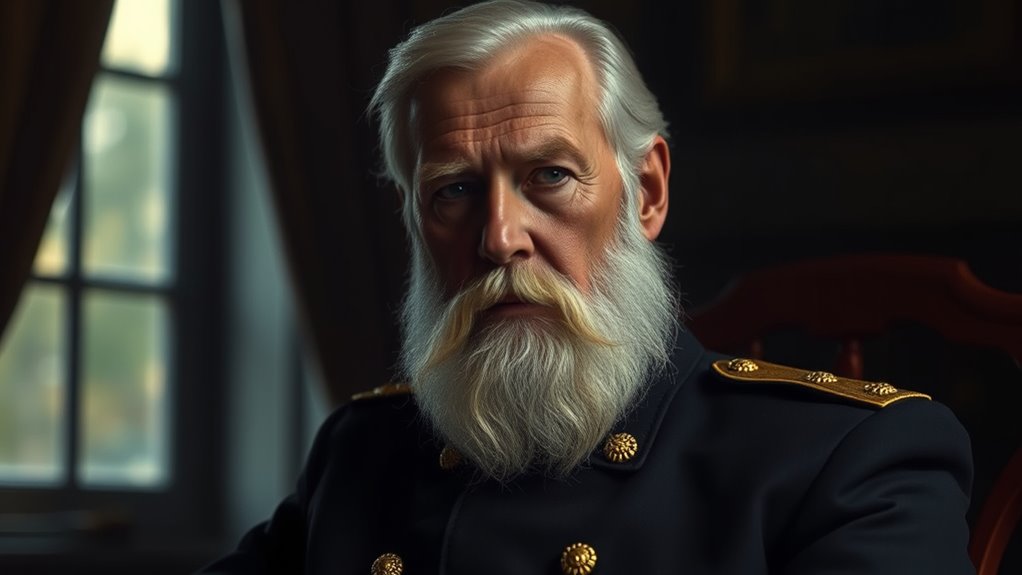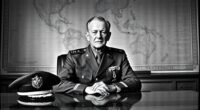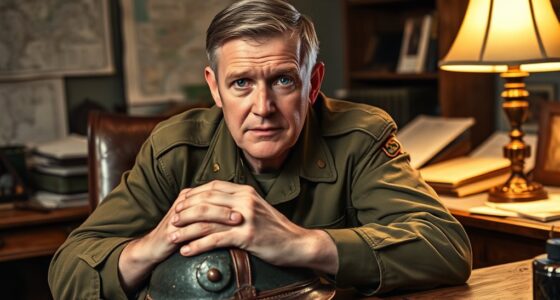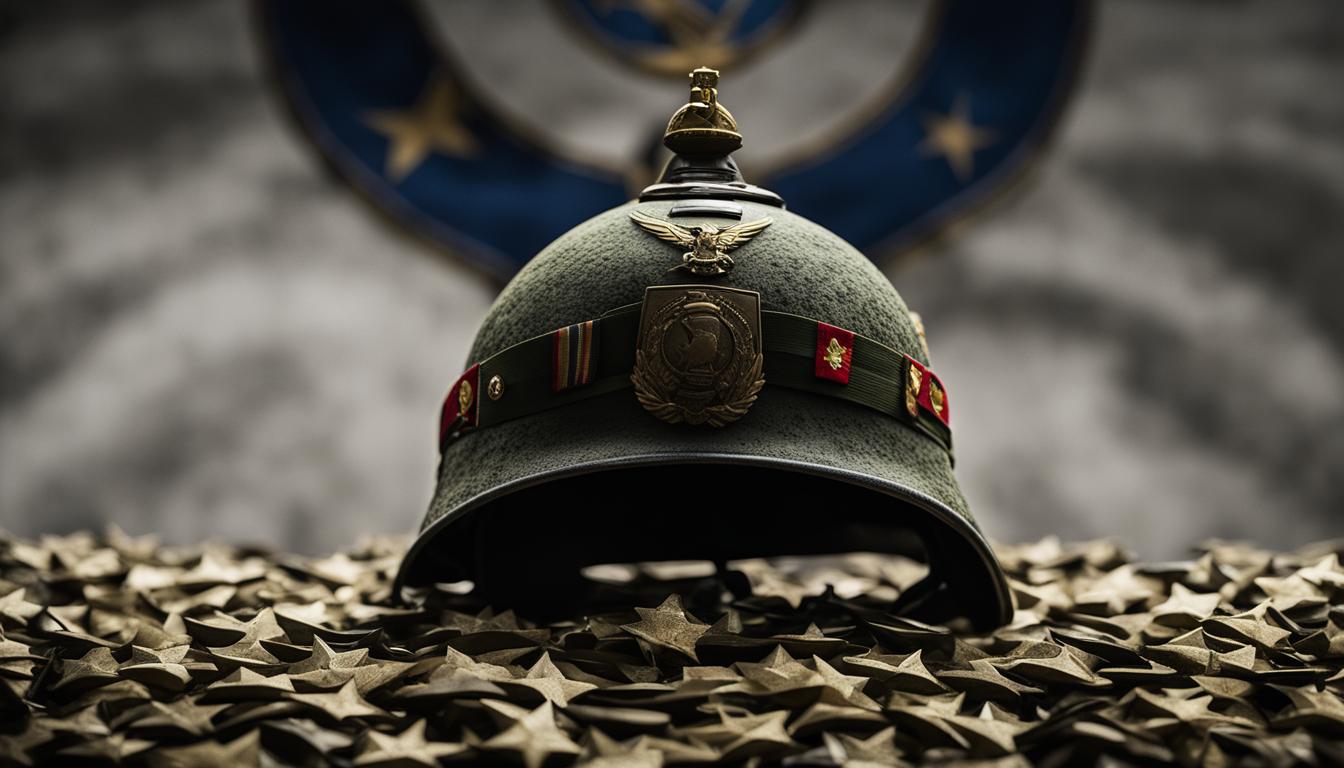General Robert E. Lee believed that war reveals human strength and tests moral character. He understood that conflict is terrible but also necessary for growth and justice. By making daring, strategic moves and inspiring loyalty, he demonstrated that true leadership blends battlefield skill with moral resolve. His legacy shows that even in war’s chaos, integrity and resilience matter. If you explore further, you’ll discover how his leadership shaped history and the enduring lessons he left behind.
Key Takeaways
- Lee believed war revealed the true character of nations and individuals, emphasizing its moral and spiritual significance.
- His strategic mastery aimed to minimize unnecessary suffering while achieving military objectives.
- Lee recognized the terrible cost of war but saw it as a necessary and purifying force for societal change.
- He emphasized the importance of moral responsibility and honor amidst the brutality of conflict.
- Lee’s leadership reflected a profound awareness of war’s destructive power and the resilience required to face it.

Have you ever wondered what made Robert E. Lee such a legendary figure during the Civil War? It’s not just his reputation as a brilliant tactician that sets him apart, but also the way he embodied Southern leadership and adapted Civil War strategies to the challenges he faced. Lee’s understanding of military tactics and his ability to inspire loyalty played a pivotal role in his successes. When you examine his campaigns, you see a leader who prioritized bold, strategic decisions over sheer numbers or resources. His approach often involved daring maneuvers, like the famous flanking movements and surprise attacks, which kept Union forces guessing and often off-balance.
Lee’s mastery of Civil War strategies was rooted in a keen sense of battlefield psychology and an ability to exploit the terrain. He knew that victory didn’t always depend on overwhelming force but on careful planning and timing. This is especially evident in battles like Chancellorsville and Fredericksburg, where he achieved remarkable results against larger Union armies. His leadership wasn’t just about tactics; it was about inspiring his troops to believe in their cause and to fight with a ferocity that matched his own resolve. As a Southern leader, he carried the burden of defending a way of life that he believed was under threat, yet he maintained a sense of duty and honor that transcended politics.
Lee’s strategic genius combined terrain mastery and inspiring leadership to outwit larger armies with daring, carefully planned maneuvers.
You can see how his leadership style was shaped by a deep sense of responsibility. Lee often made difficult decisions, balancing the strategic needs of his army with the moral and social implications of the conflict. His ability to rally his men, even in dire circumstances, was rooted in his personal integrity and commitment. Despite the hardships, he maintained a focus on achieving tactical advantages, sometimes risking everything for a chance at a breakthrough. His strategic retreats and calculated assaults reflect a leader who understood that war, as terrible as it is, sometimes demands the harshest choices for the greater good. Additionally, his strategic use of espionage and intelligence played a crucial role in his military successes, demonstrating how vital covert operations were even in the Civil War.
In essence, Robert E. Lee’s legacy is built on his exceptional leadership and innovative use of Civil War strategies. He epitomized Southern resilience and tactical brilliance, demonstrating that true leadership requires more than just command—it demands vision, adaptability, and moral strength. His role in the war reminds you that even in the darkest times, strategic insight and unwavering resolve can leave an enduring impact on history.
Frequently Asked Questions
How Did Lee’s Leadership Influence the Outcome of the Civil War?
Your understanding of Lee’s leadership influence shows how his Civil War strategy often boosted Confederate morale and inspired troops. His bold tactics and strategic decisions, like the Battle of Chancellorsville, showcased his military genius. You can see that his leadership influenced the war’s outcome by making tough choices that prolonged the conflict and challenged Union forces, demonstrating that effective leadership can shape history even in the darkest times.
What Was Lee’s Life Like After the War Ended?
After the war, you see Lee dedicated himself to post-war reconciliation, working to heal a divided nation. He became president of Washington College, focusing on education and unity in Virginia. His legacy endures as a symbol of honor and humility, shaping the state’s history. You can visit his estate, Arlington House, which stands as a reminder of his influence and efforts toward reconciliation and rebuilding Virginia’s community.
Did Lee Have Any Significant Relationships Outside of the Military?
You’ll find that Lee had meaningful relationships outside the military, especially with his family connections and social circles. He valued his wife and children deeply, often seeking solace in their company. His friendships extended beyond the battlefield, fostering bonds within Southern society. Though his life was largely defined by his military career, these personal relationships provided him comfort and grounding amidst changing times.
How Is Lee Remembered in Modern American Society?
You see Lee’s legacy as complex, symbolizing both Confederate history and Southern heritage. Modern memorials and debates reflect how he’s remembered today. Some honor his military skill, while others criticize his role in slavery and secession. Public opinion varies, and conversations about his legacy continue to shape how society commemorates him. Ultimately, Lee’s memory prompts ongoing reflection on history, morality, and reconciliation.
What Were Lee’s Personal Beliefs Regarding Slavery and Equality?
You learn that Lee’s personal beliefs regarding slavery and racial equality are complex. While he fought to preserve the Confederacy, he expressed private doubts about slavery, suggesting it was morally wrong. However, he also believed that racial equality should not be forced immediately, advocating for gradual change. His views reflect a nuanced stance, balancing his loyalty to his state with personal moral conflicts about slavery and racial issues.
Conclusion
You see, Lee’s words remind us that war, like a fierce storm, tears through the fabric of peace with relentless fury. Though it’s terrible, it shapes our understanding, carving deep scars and lessons into the soul of history. As you reflect, remember that even in chaos, there’s a haunting beauty—a reminder that sometimes, it’s only through the darkness that we glimpse the true light of humanity’s resilience.
Joy, as our Editor in Chief, ensures the highest standard of content. Her talent in writing is complemented by her attention to detail and passion for literature and culture. Joy’s expertise and love for the English language shine through in her editorial work, making each piece a testament to quality and clarity.









